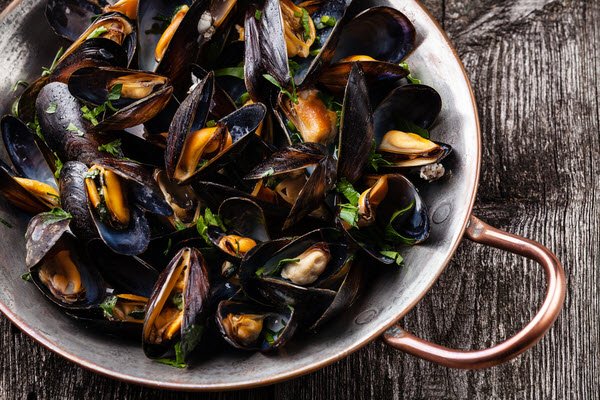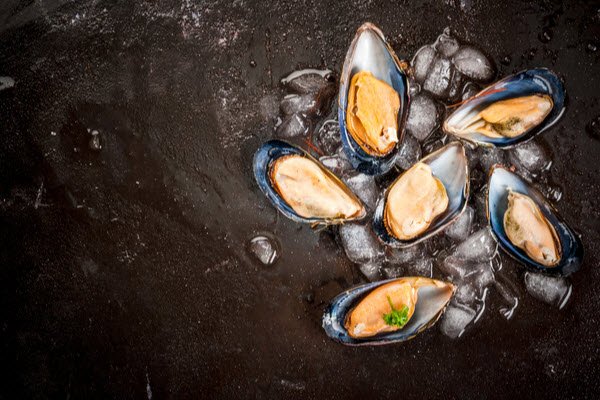Ten surprising mussel facts
At Eyre Peninsula Seafoods, we live and breathe mussels. Not to mention the number of mussels we eat! We know everything there is to know about these heroes of the sea. We’re not short on mussel facts and we’ve shared ten of our favourites here to give you even more love for our favourite sustainable seafood.
1. You can eat an unopened mussel
You’ve probably heard that if a mussel doesn’t open during cooking, you must throw it out. Well, we’re here to tell you that isn’t necessary.
When a mussel doesn’t open, it doesn’t mean that it’s off. It simply means that it has super strong adductor muscles that just won’t budge. You can prise it open with a knife and it will still be fine to eat.
This is a myth that has persisted for no good reason. So, we’re setting the record straight with the mussel facts!
2. Mussels are good for the ocean
Not only do they taste great, mussels are a crucial part of healthy marine ecosystems. Without mussels, the ocean and her inhabitants wouldn’t fare so well. And that’s because mussels are natural filter feeders.
Every day, a single mussel will filter up to 20 litres of seawater, removing phytoplankton and sediment. They essentially vacuum as they grow.
3. Mussels have more iron than fillet steak
It’s quite amazing to think that such a small morsel can have so much iron, but it does.
Mussels are a great source of iron. They are a lean protein and will keep you feeling fuller for longer.
Steamed mussels are healthy, delicious and super easy to prepare.
4. There are male and female mussels
Have you ever wondered why some mussels are orange and others are white? It all comes down to gender.
The orange mussels are female and the creamy white mussels are male. Both have the same rich, sweet flavour you love.
How’s that for a mussel fact?
5. Mussels pack a vitamin punch
We’ve told you that mussels are full of protein and iron, but they also contain a raft of other vitamins that make them a delicious healthy choice.
In every mussel, you will find omega-3 fatty acids, vitamins A and B12, zinc, iodine and selenium. Those vitamins and minerals can help improve brain function, reduce inflammatory conditions, regulate thyroid hormones and contribute to your overall immune system and healthy eyes and glowing skin.
6. Mussels have beards
Mussels were the original hipsters! The beard on a mussel – aka the byssus – is less about aesthetics and more about functionality.
As the mussel develops, it grows a mass of threads which it uses to secure itself to a solid surface where it will continue to grow.
Before you eat a mussel, you need to remove the beard. Our premium mussels are already debearded – no mess, no fuss!
7. Mussels are farmed on longlines
This method of mussel farming actually has a number of benefits. Firstly, by capturing the wild spat (baby mussels) and reseeding them onto longline ropes, it gives them plenty of room to grow into their shells.
Secondly, because the mussels are suspended above the ocean floor, you won’t find any grit or sediment inside them like you would otherwise.
And finally, the cotton sock we use to secure the mussels to the ropes while the beard grows is biodegradable. It leaves no trace behind, making mussels an exceptionally sustainable seafood.
8. Mussels are cooked live
If you cook a dead mussel, not only will it taste off but it is also a food safety issue. Mussels must be cooked live.
We developed our SeaSure packaging to keep them alive and well in their journey to your dinner plate. In every packet we add an extra dose of oxygen saturated water to keep the mussels stress free. A stress free mussel is a sweet mussel.
Our SeaSure packaging also extends the life of the mussel. From the time the mussels are packaged, you have ten days to cook them. You should always keep the mussels in the fridge and, ideally, cook them the same day you open the packet.
9. You will smell an off mussel before you taste it
If it’s not the case that the bad mussels are the ones that don’t open when they are cooked, how do you tell if a mussel is bad? The answer is – with your nose.
You will always smell a bad mussel long before you taste it. It’s not a smell you can miss, nor is it one you can easily forget.
Remember to eat with your nose and you’ll be right!
10. Mussels are flavour carriers
Mussels are a versatile source of protein. Whatever flavours you pair them with, they soak up the flavour and enhance the dish.
From garlic mussels to chilli mussels, mussels in white wine or laksa mussels, there are so many flavour combinations and mussel recipes you can try to suit every palate.
The most important mussel facts of them all
The fact is, it all starts with quality mussels. You can pick up a packet of our premium mussel brands – Kinkawooka Shellfish and Boston Bay Mussels – at your local supermarket or speciality seafood retailer.
We’ve got mussel facts… but we’ve also got the best mussels around.











